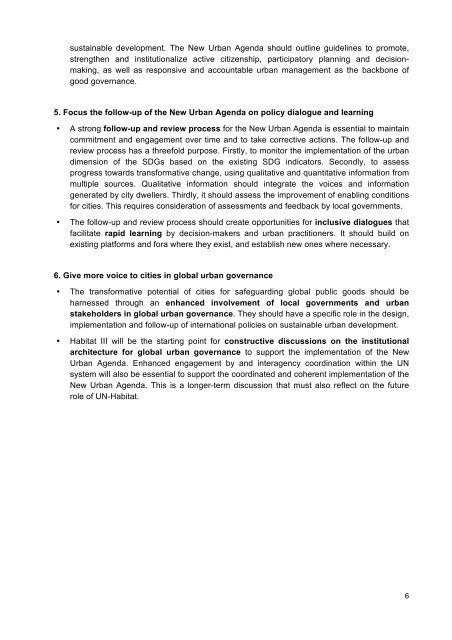Berlin Recommendations for the Cities of Tomorrow
berlin_recommendations
berlin_recommendations
You also want an ePaper? Increase the reach of your titles
YUMPU automatically turns print PDFs into web optimized ePapers that Google loves.
sustainable development. The New Urban Agenda should outline guidelines to promote,<br />
streng<strong>the</strong>n and institutionalize active citizenship, participatory planning and decisionmaking,<br />
as well as responsive and accountable urban management as <strong>the</strong> backbone <strong>of</strong><br />
good governance.<br />
5. Focus <strong>the</strong> follow-up <strong>of</strong> <strong>the</strong> New Urban Agenda on policy dialogue and learning<br />
• A strong follow-up and review process <strong>for</strong> <strong>the</strong> New Urban Agenda is essential to maintain<br />
commitment and engagement over time and to take corrective actions. The follow-up and<br />
review process has a threefold purpose. Firstly, to monitor <strong>the</strong> implementation <strong>of</strong> <strong>the</strong> urban<br />
dimension <strong>of</strong> <strong>the</strong> SDGs based on <strong>the</strong> existing SDG indicators. Secondly, to assess<br />
progress towards trans<strong>for</strong>mative change, using qualitative and quantitative in<strong>for</strong>mation from<br />
multiple sources. Qualitative in<strong>for</strong>mation should integrate <strong>the</strong> voices and in<strong>for</strong>mation<br />
generated by city dwellers. Thirdly, it should assess <strong>the</strong> improvement <strong>of</strong> enabling conditions<br />
<strong>for</strong> cities. This requires consideration <strong>of</strong> assessments and feedback by local governments.<br />
• The follow-up and review process should create opportunities <strong>for</strong> inclusive dialogues that<br />
facilitate rapid learning by decision-makers and urban practitioners. It should build on<br />
existing plat<strong>for</strong>ms and <strong>for</strong>a where <strong>the</strong>y exist, and establish new ones where necessary.<br />
6. Give more voice to cities in global urban governance<br />
• The trans<strong>for</strong>mative potential <strong>of</strong> cities <strong>for</strong> safeguarding global public goods should be<br />
harnessed through an enhanced involvement <strong>of</strong> local governments and urban<br />
stakeholders in global urban governance. They should have a specific role in <strong>the</strong> design,<br />
implementation and follow-up <strong>of</strong> international policies on sustainable urban development.<br />
• Habitat III will be <strong>the</strong> starting point <strong>for</strong> constructive discussions on <strong>the</strong> institutional<br />
architecture <strong>for</strong> global urban governance to support <strong>the</strong> implementation <strong>of</strong> <strong>the</strong> New<br />
Urban Agenda. Enhanced engagement by and interagency coordination within <strong>the</strong> UN<br />
system will also be essential to support <strong>the</strong> coordinated and coherent implementation <strong>of</strong> <strong>the</strong><br />
New Urban Agenda. This is a longer-term discussion that must also reflect on <strong>the</strong> future<br />
role <strong>of</strong> UN-Habitat.<br />
6



